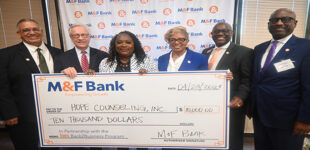Commentary: Local retailers and restaurants struggle despite rosy economic data
Algenon Cash

By Algenon Cash
The Tavern in Old Salem recently announced they will cease operations at the end of December. The restaurant is part of Old Salem Museums & Gardens and was originally built in 1784. The closure comes on the heels of other popular restaurants deciding to close up shop – Uncle Buzzy’s as well as Hutch & Harris.
Undoubtedly, the announcements have sent the food community reeling, with some well-known owners and operators declaring residents must rally and do more to support the downtown restaurant scene. The Business 40 road closure is often cited as one major reason for struggling retailers and restaurants in downtown.
I agree that we need more engagement from local residents to support the efforts of retailers and restaurant owners. But I disagree that the focus needs to be centered on small businesses located in downtown. Quite frankly, a short trip around the city will reveal many small businesses that are working like dogs to keep the doors open, with most small businesses only one unexpected incident from having to shut down.
Yes, we need you to buy stuff, but more importantly, we need you to be an advocate – which means you help us get it right when we are getting it wrong; you don’t tear down local businesses; you demonstrate patience when we experience growing pains; you consider us first; and you promote us just as much as you promote the big national players.
Supporting locally-owned businesses also benefits local residents. When a consumer buys local products or services, more of that money stays in the community to help local causes. A recent study found that for every $100 spent at a local business, $68 remained in the city.
Not to mention locally-owned businesses often seek to deliver products and services in forgotten depressed areas, which breathes new life into blighted neighborhoods.
Buying local also gives you a unique attachment to the people behind the business. I’ve never walked into a Papa John’s Pizza and saw John Schnatter in the kitchen cooking. However on any given night when I visit Carrabba’s Italian Grill located at 587 South Stratford Road, I may be greeted by the owner and operator, Daniel Butner, who is actually working in the restaurant to get his delicious food out to hungry guests.
Walk into a variety of other local restaurants and you quickly notice the same – Forsyth Seafood and, of course, Zesto Burgers & Ice Cream, to name a couple.
Small businesses are the backbone of America, creating over 70% of all new jobs in the country. Of course that makes locally-owned businesses the heart of any community. Local businesses create a unique fabric in towns across the nation and make each city different from every other city in the world.
Not to mention I’ve never seen Amazon, WalMart, or Apple donate to local churches, support little league teams, or purchase ads in the high school yearbooks.
On the other hand, Zesto just concluded a spirit week for Carver High School cheerleaders and ultimately helped some incredible athletes raise money for new uniforms and equipment. Large corporate-based enterprises rarely support micro causes.
Many small business owners located in downtown are quick to blame the Business 40 improvement project as the reason for their woes, but I firmly believe the road closure is simply one variable amongst many that are pressuring local small businesses.
Have a conversation with any local official and they will attempt to convince you the city is growing better than most, population growth is humming, job growth is booming, the cost of living is low, and everybody in the nation wants to move to Winston-Salem. Meet with a small business owner and they will quickly adjust your perception of the city’s economic development climate.
We are adding new businesses and restaurants at a pace that is stronger than we are growing the overall economy – conclusively that’s why everyone is struggling, not just the small businesses in downtown. We live in capitalist society and therefore any individual willing to risk and lose capital is able to start a business – and let me be clear, that fact should not change.
However, we need local city officials and economic developers to do their part in creating an environment where the private sector has the greatest probability to survive and in due time thrive. Right now, that’s not occurring in our region.
Forsyth County is growing much slower than North Carolina overall. Forsyth County had a population of 379,099 in 2018, a growth of less than 1% since 2017 and just above 8% from 2010 to 2018.
Nevertheless, the state’s entire population grew by 1.1% from 2017 to 2018, and expanded nearly 9% for the period 2010 to 2018. The Charlotte and Triangle areas now account for 70% of population growth – Mecklenburg grew 1.5% and Wake increased by nearly 2% from 2017 to 2018. Compare the larger Charlotte or Triangle metropolitan areas to the greater Triad and the gaps are fairly wide – both areas outpaced our regional growth at twice the rate.
Winston-Salem has an average hourly wage of $22.05, about 12% below the national average of $24.98 – also lower than neighboring regions – Charlotte ($24.52) and Raleigh ($25.28).
Average hourly wages can be easily misconstrued because of large outliers. I prefer to focus on median wages because they are not as easily manipulated by high-income earners, who often work in white-collar jobs. The median hourly wage in Winston-Salem is $16.87 an hour, almost $2 below the national average.
Winston-Salem continues to perform poorly at attracting and retaining talented Millennials – which is a major challenge that we must overcome to grow the population, grow sales at local businesses, and boost the overall economy.
SmartAsset recently announced a list of states where Millennials are moving and North Carolina ranked #5, with a net migration of 18,824, and beat other southern states such as Georgia. Look deeper at the actual cities attracting Millennials – Charlotte (#6), Greensboro (#18), and Raleigh (#23) – completely absent from the list is Winston-Salem.
Algenon Cash is a nationally recognized speaker and the managing director of Wharton Gladden & Company, an investment-banking firm. Reach him at acash@algenoncash.com.
















